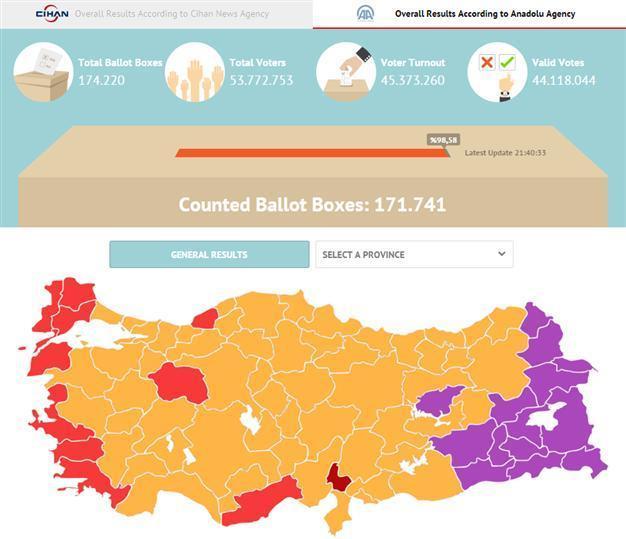10 minutes that shook Turkey's ruling AKP
ALİ KAYALAR - ANKARA

It wasn’t 10 days that shook the world, but it was certainly 10 minutes that shook the Justice and Development Party (AKP), as the fortunes of the party that has ruled Turkey for the past 13 years witnessed a seismic shift in just 10 minutes with the results from the putatively autonomous but state-controlled Anadolu Agency.
The Peoples’ Democratic Party’s (HDP) “do-or-die” challenge against the 10 percent threshold was set to determine the final result, as the bid by the party, which is focused on the Kurdish issue but has reached out to the rest of Turkey, would hamper the AKP’s goal of keeping a parliamentary majority, which requires 276 of 550 seats.
As of 7:02 pm, about two hours after the close of the polls, the agency’s data flow to media companies showed the AKP votes at 45.6 percent, while the HDP stood at 9.2. Basically, this would have granted 332 seats to the ruling party, thereby facilitating President Recep Tayyip Erdoğan’s naked ambition to shift Turkey to a powerful presidential system from the current parliamentary via a referendum.
Within 10 minutes, however, everything had changed. At 7:11 p.m., the agency displayed enough bravery (having previously gained notoriety for vastly overinflating AKP votes at the outset of vote counts in past elections) to inform users that the HDP had surpassed the threshold, as the AKP’s votes fell slightly to 44.6 percent. This meant that the AKP would lose another 59 seats, ruling out a one-party government. The party’s bid to take a constitutional change to a referendum on the steam of its own MPs also vanished.
The gap widened later, but that first 10 minutes marked the time when life completely changed for the AKP, which has enjoyed 13 years in power.
This was also when the AKP side began producing justifications for the results.
Erdoğan’s chief adviser, Yiğit Bulut, for example, said in a televized interview that the results once again showed that Turkey needed a presidential system, as fewer seats for the AKP would prevent single-party rule.
More statements will come from the ruling party and its allies. But the agency’s opaque methodology for reporting vote counts remains a mystery for many. As such, journalists were cautious about the Anadolu results, especially in the wake of the presidential elections of Aug. 30, 2014.
 It wasn’t 10 days that shook the world, but it was certainly 10 minutes that shook the Justice and Development Party (AKP), as the fortunes of the party that has ruled Turkey for the past 13 years witnessed a seismic shift in just 10 minutes with the results from the putatively autonomous but state-controlled Anadolu Agency.
It wasn’t 10 days that shook the world, but it was certainly 10 minutes that shook the Justice and Development Party (AKP), as the fortunes of the party that has ruled Turkey for the past 13 years witnessed a seismic shift in just 10 minutes with the results from the putatively autonomous but state-controlled Anadolu Agency.